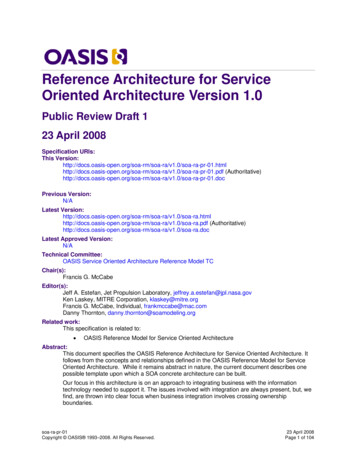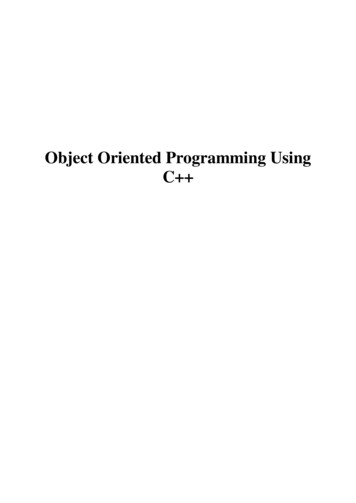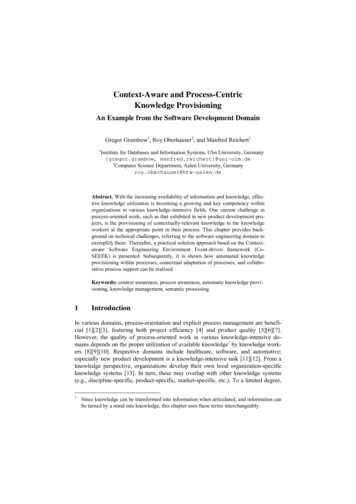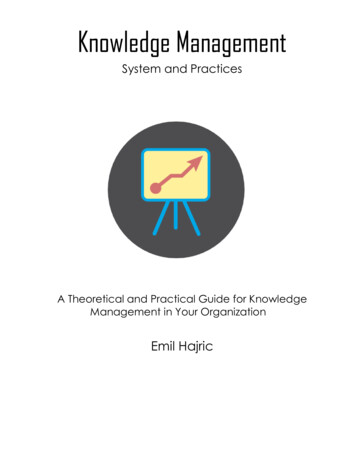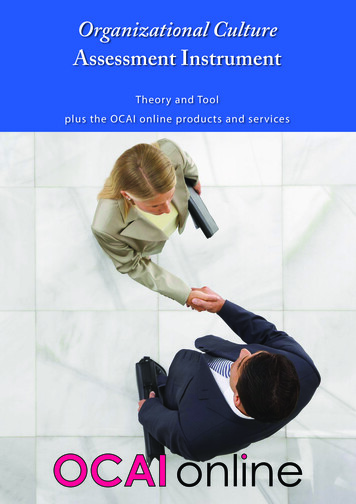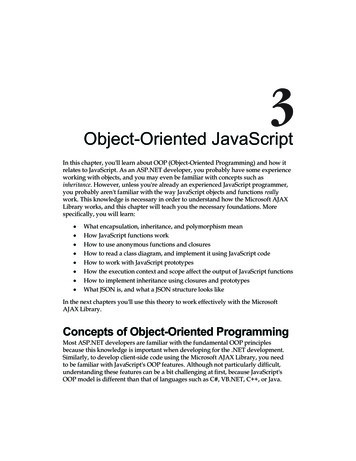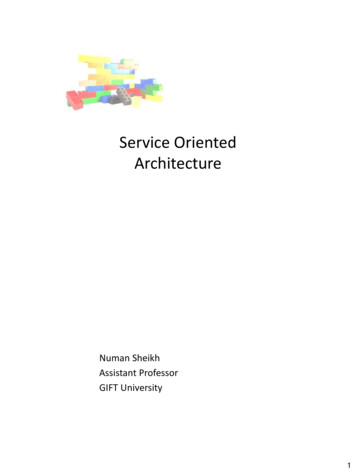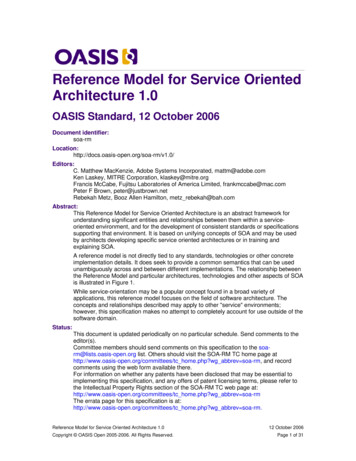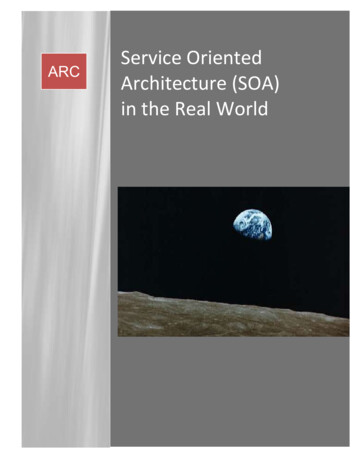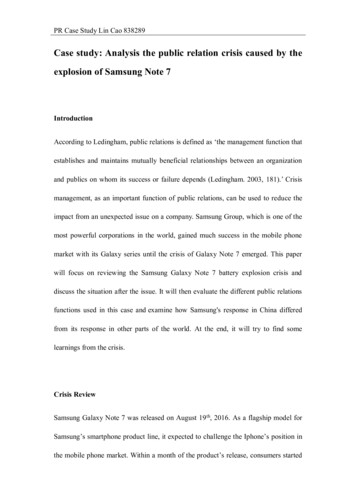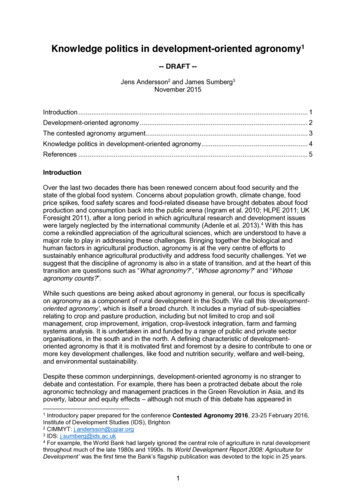
Transcription
Knowledge politics in development-oriented agronomy1-- DRAFT -Jens Andersson2 and James Sumberg3November 2015Introduction . 1Development-oriented agronomy . 2The contested agronomy argument. 3Knowledge politics in development-oriented agronomy . 4References . 5IntroductionOver the last two decades there has been renewed concern about food security and thestate of the global food system. Concerns about population growth, climate change, foodprice spikes, food safety scares and food-related disease have brought debates about foodproduction and consumption back into the public arena (Ingram et al. 2010; HLPE 2011; UKForesight 2011), after a long period in which agricultural research and development issueswere largely neglected by the international community (Adenle et al. 2013).4 With this hascome a rekindled appreciation of the agricultural sciences, which are understood to have amajor role to play in addressing these challenges. Bringing together the biological andhuman factors in agricultural production, agronomy is at the very centre of efforts tosustainably enhance agricultural productivity and address food security challenges. Yet wesuggest that the discipline of agronomy is also in a state of transition, and at the heart of thistransition are questions such as “What agronomy?”, “Whose agronomy?” and “Whoseagronomy counts?”.While such questions are being asked about agronomy in general, our focus is specificallyon agronomy as a component of rural development in the South. We call this ‘developmentoriented agronomy’, which is itself a broad church. It includes a myriad of sub-specialtiesrelating to crop and pasture production, including but not limited to crop and soilmanagement, crop improvement, irrigation, crop-livestock integration, farm and farmingsystems analysis. It is undertaken in and funded by a range of public and private sectororganisations, in the south and in the north. A defining characteristic of developmentoriented agronomy is that it is motivated first and foremost by a desire to contribute to one ormore key development challenges, like food and nutrition security, welfare and well-being,and environmental sustainability.Despite these common underpinnings, development-oriented agronomy is no stranger todebate and contestation. For example, there has been a protracted debate about the roleagronomic technology and management practices in the Green Revolution in Asia, and itspoverty, labour and equity effects – although not much of this debate has appeared inIntroductory paper prepared for the conference Contested Agronomy 2016, 23-25 February 2016,Institute of Development Studies (IDS), Brighton2 CIMMYT: j.andersson@cgiar.org3 IDS: j.sumberg@ids.ac.uk4 For example, the World Bank had largely ignored the central role of agriculture in rural developmentthroughout much of the late 1980s and 1990s. Its World Development Report 2008: Agriculture forDevelopment’ was the first time the Bank’s flagship publication was devoted to the topic in 25 years.11
mainstream agronomy journals (Griffin 1974; Conway 1999; Evenson and Gollin 2003; Orr2012; Patel 2013). Recent years have seen claims and counter claims, evidence andcounter evidence, as well as contradictory conclusions, endorsements andrecommendations about, for example, the performance and potential value of geneticallymodified (GM) crops, the System of Rice Intensification (SRI), Conservation Agriculture(CA), organic farming’s ability to feed the world, the Savory holistic grazing method, NewRice for Africa (NERICA), Climate Smart Agriculture, Sustainable Intensification and so on.Such contestations cannot be dismissed as either aberrations or as a failure of the discipline.On the contrary, they appear to be an increasingly common feature of agronomy as ascientific discipline. As argued and exemplified in Contested Agronomy: Agriculturalresearch in a changing world (Sumberg and Thompson 2012), they are worthy of seriousanalysis for what they can tell us about the politics and power relations that underpin andorient the production and promotion of development-oriented agronomic knowledge.In the next section of this introductory paper we explore the notion of development-orientedagronomy. We then briefly summarise the original contested agronomy argument. Followingthis, the paper focuses on the notion of knowledge politics, which sits at the core ofcontested agronomy.Development-oriented agronomyDevelopment-oriented agronomy as we know it today has its roots firmly in the Europeancolonial era (Ross 2014). The ecosystems, crops, soils and farming practices that colonialofficers encountered in Africa, Asia and Latin America – and the drive to use or to modifythese to fuel European economic expansion – framed the development of the new subspeciality of “tropical agronomy”. But aside from a focus on tropical areas and the closeassociation with the authority of the colonial project, as a field of knowledge creation, therewas little inherent coherence to tropical agronomy.The shift from tropical agronomy to development-oriented agronomy took place over anumber of years and reflected the change from colonial to independent administrations; thedevelopment of national agricultural research organisations and capabilities; a greateremphasis on food crops and rural poverty alleviation; and more generally, the emergence ofthe ‘developmental state’ (Leftwich 1995). In parallel, as colonial configurations transitionedto the new institutions and international relations of foreign aid, technical and developmentassistance, development-oriented agronomy took on a strong international dimension with,for example, the establishment of the UN Food and Agriculture Organisation (FAO), theConsultative Group for International Agricultural Research (CGIAR) and other regionalresearch organisations, and a network of students, relations and partnerships linkingagricultural universities and institutions in the south and the north.If tropical agronomy lacked coherence as field of knowledge creation, a similar charge canalso be levelled at development-oriented agronomy. A variety of understandings of andapproaches to development-oriented agronomy are evident, as exemplified by differentdefinitions and research traditions. For example, the Oxford English Dictionary (2012)defines agronomy as “the practice or (now chiefly) the science of crop production and soilmanagement”, while the American Society of Agronomy’s Agronomy Journal states that itpublishes:“articles relating [ ] soil-plant relationships; crop science; soil science; biometry; crop,soil, pasture, and range management; crop, forage, and pasture production andutilization; turfgrass; agroclimatology; agronomic modeling; statistics; productionagriculture; and computer ications/aj/about2
Here agronomy is framed as an essentially technical science that has little overt concernwith the social, economic or political relations within which agriculture and agronomicresearch are undertaken. A somewhat broader perspective is apparent in the definition ofagronomie given in Larousse agricole:“Ensemble des sciences nécessaires à la compréhension de l'agriculture et destechniques utiles à sa pratique. Au sens strict, l'agronomie est l'étude scientifique desrelations entre les plantes cultivées, le milieu (sol, climat) et les techniques agricoles.Dans un sens plus large, elle comprend aussi l'ensemble des sciences et des techniquesrelatives à l'élevage, à la sylviculture, au génie rural. Enfin, l'économie, la sociologie, lacomptabilité et la gestion de l'exploitation agricole sont aujourd'hui considérées commedes sciences nécessaires à la compréhension des techniques”6 (Larousse agricole,Édition 2002).One could conclude from this that the Francophone tradition of agronomy and agronomictraining is inherently more holistic, situated and systems-oriented. However, it wouldprobably be a mistake to draw too sharp a distinction between Anglophone andFrancophone traditions in development-oriented agronomy. For instance, both traditionsmade important contributions to the farming systems research movement of the 1980s and1990s (Collinson 2000; Fresco 1984), which can be seen as one attempt to broaden andsituate development-oriented agronomy (although at least on the Anglophone side, largelyled by economists). Similarly, the push to both broaden and situate agronomy can also bediscerned in today’s sustainable agriculture and agroecology movements (Wezel et al.2009), and in the interest within the CGIAR and elsewhere in so-called “agricultural researchfor development” (AR4D) (Virchow and von Braun 2001; von Kaufmann 2007; cf. Coe et al.2014).The contested agronomy argumentAs set out by Sumberg et al. (Sumberg et al. 2012b, 2012c) the contested agronomyargument has four main elements:1. Over the last four decades the context within which development-oriented agronomytakes place has been transformed fundamentally, with the most important changesbeing the rise of (a) the neoliberal project; (b) the environmental agenda; and (c) theparticipation agenda.2. As a result, the long-standing unity of purpose between the state, on the one hand,and the agronomic research establishment, on the other, was undermined.Agronomy ceased to be the handmaiden of the state, with important implications forhow development-oriented agronomy is conceived, funded, managed, implemented,evaluated and portrayed.3. With less unity of purpose, and in the more crowded, competitive, short-term andimpact-oriented funding context, agronomy has become an altogether morecontested and contentious space: the politics around agronomic knowledge is nowless controlled and much more public.[[All the sciences necessary to the understanding of agriculture and the techniques to practice it.Strictly speaking, agronomy is the scientific study of the relationships between cultivated plants, theenvironment (soil, climate) and agricultural techniques. In a much broader sense, it also includes allsciences and technologies related to livestock (breeding), forestry and rural engineering. Finally,economics, sociology, accounting and management of the farm are nowadays also considerednecessary for understanding technology.]]63
4. This new knowledge politics around development-oriented agronomy is havingimportant impacts on the discipline itself, and on its ability address the challenge ofsustainably enhancing agricultural productivity.The environmental and participation agendas certainly helped to restructure the languageand re-orient the gaze of development-oriented agronomy. For example, today when wordslike “agriculture”, “farming systems” and “intensification” appear without being preceded by“sustainable”, it is as if a sacred rule or norm is being publically and dangerously flouted.Also, the propositions that farmers are knowledgeable, that agronomic research should beclient- or demand-driven, and that potential users of technology have a role to play intechnology development, are now commonly accepted amongst agronomists. While theextent to which the environmental and participation agenda have really changed thepriorities, methods or outputs of development-oriented agronomy is still a matter of debate,there can be little doubt that new spaces have been opened up for the public contestation ofagronomy’s goals, priorities, methods, results and recommendations.At the same time, the effects of the neoliberal project on development-oriented agronomyhave been very real. The goal of shrinking the state and strengthening accountability led tothe embedding of New Public Management (NPM) principles in government and publicinstitutions (Dunleavy and Hood 1994; Manning 2001). These principles include performanceauditing and measurement, privatisation, competition, strategic planning and managementand public-private partnership (Gruening 2001). For agricultural research this has meant afundamental change in the basis on which research programmes are conceived, fundsallocated and investments evaluated.The influence of NPM can be seen in the emphasis that funders of agricultural research nowput on establishing results frameworks, elaborating targets, identifying quick wins, meetingdelivery schedules, theorising impact pathways, and demonstrating “value for money” andultimately impact. The CGIAR’s Strategy and Results Framework 2016-20257 with its vision,mission, three strategic goals or system-level outcomes (SLOs), ten IntermediateDevelopment Outcomes (IDOs) and 32 sub-IDOs is a case in point, but it is certainly notunique. Sumberg et al. (2012c) suggested that these measures would likely favourdownstream over upstream and short-term over long-term research, which would be at oddswith the rhetorical focus on sustainability. In this context, the need to demonstrate “impact atscale” creates strong incentives for individuals and organisations at all levels – from fieldbased research agronomists to bi- and multi-lateral research funders – to establish anddefend their particular contributions. It is ironic that in the era of evidence-based policy and“rigorous” impact evaluation, the “success story” has become a format of choice in thestruggle to convince funders, politicians and the public of the benefits of developmentoriented agricultural research (e.g. Wiggins 2009; Spielman and Pandya-Lorch 2009; cf.Sumberg et al. 2012a).It is in this context that a focus on the knowledge politics within development-orientedagronomy becomes particularly important.Knowledge politics in development-oriented agronomyThe idea that knowledge and evidence are steeped in power and politics is now widelyaccepted. Robert Chambers’ simple question “Whose knowledge?” (Chambers 1983)reminds us of the existence of different knowledges, and the inherent limitations of thinkingin terms a single objective truth or reality. The political angle comes into play in the ways .pdf?sequence 14
individuals and groups selectively generate and/or use knowledge to establish, maintain orenhance their vested interests or ideologies. The common presumption in much of theliterature on knowledge politics is that powerful actors are better placed to do thissuccessfully than other actors.Contested Agronomy: Agricultural research in a changing world, primarily sought to drawattention to the rise of a more explicit knowledge politics within and around the field ofagronomy. It sought to open up the analysis of agronomic knowledge production,appropriation and application in terms of different interests, networks, epistemic communitiesand asymmetric power relations (e.g. Andersson and Giller 2012; Brooks and JohnsonBeebout 2012). In so doing it brought to the fore the role of the agronomist, but perhapsmore importantly, the role of agronomic research institutes, as political actors. Focusing onspecific contestations and alliances among agronomic scientists, and between agronomists,policy makers, practitioners and other development actors, provides a logical entry-point foranalysis of the politics of development-oriented agronomic research. This focus highlightsimportant questions such as: “Who are the powerful actors?”, “What are their vestedinterests?” and “How is knowledge created and mobilised within epistemic communities toconstruct and promote particular framings and narratives in support of these interests?”If taken seriously, a knowledge politics perspective means that agronomy can no longer beregarded as the preserve of a particular category of scientists focusing on, for example, soilmanagement and crop production. After all, the politics of agronomic knowledge supportsand reflects the interests of a much wider set of actors, from national and internationalpublic-sector research organisations to multinational agri-food corporations, food sovereigntycampaigners, farmers and consumers. The analysis of knowledge politics should helpexplain why particular agricultural technologies or development pathways are favoured overothers (e.g. Vanloquerin and Baret 2009), with, in some cases, very real implications forpeoples’ food security and well-being, resource use and conservation. In this sense, puttinga spotlight on the politics of development-oriented agronomy can contribute to the openingup and enrichment of debate and deliberation about the future of farming, rural economies,food and the environment (Thompson and Sumberg 2012). Unfortunately, what the spotlightreveals is not always pretty, nor does it necessarily lead to simple recommendations foraction or immediate impact.Finally, Contested Agronomy traced the origins of contestations in agronomy through a focuson knowledge politics, and we hope that the papers and discussion at the February 2016conference will significantly deepen and broaden this analysis. While the emphasis to datehas not been on either how to do “better” agronomy or how to do agronomy better, wesuggest that important implications for the doing of agronomy arise from a recognition of andengagement with knowledge politics.ReferencesAdenle, A. A., Morris, E. J., & Parayil, G. (2013). Status of development, regulation andadoption of GM agriculture in Africa: Views and positions of stakeholder groups.Food Policy, 43, 159-166, doi:10.1016/j.foodpol.2013.09.006.Andersson, J. A., & Giller, K. E. (2012). On heretics and God's blanket salesmen: contestedclaims for Conservation Agriculture and the politics of its promotion in Africansmallholder farming. In J. Sumberg, & J. Thompson (Eds.), Contested Agronomy:Agricultural Research in a Changing World. London: Routledge.Brooks, S., & Johnson-Beebout, S. (2012). Contestation as continuity? Biofortificationresearch and the CGIAR. In J. Sumberg, & J. Thompson (Eds.), ContestedAgronomy: Agricultural Research in a Changing World. London: Routledge.Chambers, R. (1983). Rural Development: Putting the Last First. London: Longman.5
Coe, R., Sinclair, F., & Barrios, E. (2014). Scaling up agroforestry requires research ‘in’rather than ‘for’ development. Current Opinion in Environmental Sustainability, 6(7377).Collinson, M. P. (Ed.). (2000). A History of Farming Systems Research. Wallimgford: CABI.Conway, G. (1999). Doubly Green Revolution: Food for All in the Twenty First Century.Ithaca, NY: Cornell University Press.Dunleavy, P., & Hood, C. (1994). From old Public Administration to New PublicManagement. [Article]. Public Money & Management, 14(3), 9-16.Evenson, R. E., & Gollin, D. (2003). Assessing the impact of the Green Revolution, 1960 to2000. Science, 300, 758-762.Fresco, L. O. (1984). Comparing Anglophone and Francophone Approaches to FarmingSystems Research and Extension. Gainsville: Farming Systems Support Project,International Programs, Institute of Food and Agricultural Sciences, University ofFlorida.Griffin, K. (1974). The Political Economy of Agrarian Change: An Essay on the GreenRevolution. Cambridge, MA: Harvard University Press.Gruening, G. (2001). Origin and theoretical basis of new public management. InternationalPublic Maanagement Journal, 4(1), 1-25.HLPE (2011). Price Volatility and Food Security Report by the High Level Panel of Expertson Food Security and Nutrition of the Committee on World Food Security. Rome: UNFood and Agriculture Organization.Ingram, J., Ericksen, P., & Liverman, D. (Eds.). (2010). Food Security and GlobalEnvironmental Change. London: Earthscan.Leftwich, A. (1995). Bringing politics back in: Towards a model of the developmental state.The Journal of Development Studies, 31(3), 400-427,doi:10.1080/00220389508422370.Manning, N. (2001). The Legacy of the New Public Management in Developing Countries.International Review of Administrative Sciences, 67(2), 297-312,doi:10.1177/0020852301672009.Orr, A. (2012). Why were so many social scientists wrong about the Green Revolution?Learning from Bangladesh. Journal of Development Studies, 48(11), 1565-1586.Oxford English Dictionary (2012). "agronomy, n.": Oxford University Press.Patel, R. (2013). The Long Green Revolution. Journal of Peasant Studies, 40(1), 1-63.Ross, C. (2014). The plantation paradigm: colonial agronomy, African farmers, and theglobal cocoa boom, 1870s–1940s. Journal of Global History, 9(1), 49-71.Spielman, D. J., & Pandya-Lorch, R. (Eds.). (2009). Millions Fed: Proven Successes inAgricultural Development. Washington, DC: IFPRI.Sumberg, J., Irving, R., Adams, E., & Thompson, J. (2012a). Success making and successstories: agronomic research in the spotlight. In J. Sumberg, & J. Thompson (Eds.),Contested Agronomy: Agricultural Research in a Changing World. London:Routledge.Sumberg, J., & Thompson, J. (Eds.). (2012). Contested Agronomy: Agricultural Research ina Changing World. London: Routledge.Sumberg, J., Thompson, J., & Woodhouse, P. (2012b). Contested agronomy: agriculturalresearch in a changing world. In J. Sumberg, & J. Thompson (Eds.), ContestedAgronomy: Agricultural Research in a Changing World. London: Routledge.Sumberg, J., Thompson, J., & Woodhouse, P. (2012c). Why agronomy in the developingworld has become contentious. Agriculture and Human Values, 1-13,doi:10.1007/s10460-012-9376-8.Thompson, J., & Sumberg, J. (2012). Nullius in verba: contestation, pathways and politicalagronomy. In J. Sumberg, & J. Thompson (Eds.), Contested Agronomy: AgriculturalResearch in a Changing World. London: Routledge.UK Foresight (2011). The Future of Food and Farming: Challenges and Choices for GlobalSustainability, Final Project Report. London: Government Office for Science.6
Vanloquerin, G., & Baret, P. V. (2009). How Agricultural Research Systems Shape aTechnological Regime that Develops Genetic Engineering but Locks outAgroecological Innovations Research Policy, 38(6), 971-983.Virchow, D., & von Braun, J. (2001). Dresden Declaration: Towards a Global System forAgricultural Research for Development. In D. Virchow, & J. von Braun (Eds.),Villages in the Future (pp. 321-322, Global Dialogue EXPO 2000): Springer BerlinHeidelberg.von Kaufmann, R. (2007). Integrated Agricultural Research for Development: contributing tothe Comprehensive Africa Agricultural Development Programme (IAR4D in CAADP)(Advances in Integrated Soil Fertility Management in Sub-Saharan Africa: Challengesand Opportunities).Wezel, A., Bellon, S., Dore, T., Francis, C., Vallod, D., & David, C. (2009). Agroecology as ascience, a movement and a practice. A review. [Review]. Agronomy for SustainableDevelopment, 29(4), 503-515, doi:10.1051/agro/2009004.Wiggins, S. (2009). Can the smallholder model deliver poverty reduction and food securityfor a rapidly growing population in Africa? Paper presented at the Expert Meeting inHow to Feed the World in 2050, Rome, 12-13 October, 20097
Agronomy ceased to be the handmaiden of the state, with important implications for how development-oriented agronomy is conceived, funded, managed, implemented, evaluated and portrayed. 3. With less unity of purpose, and in the more crowded, competitive, short-term and impact-oriented funding context
